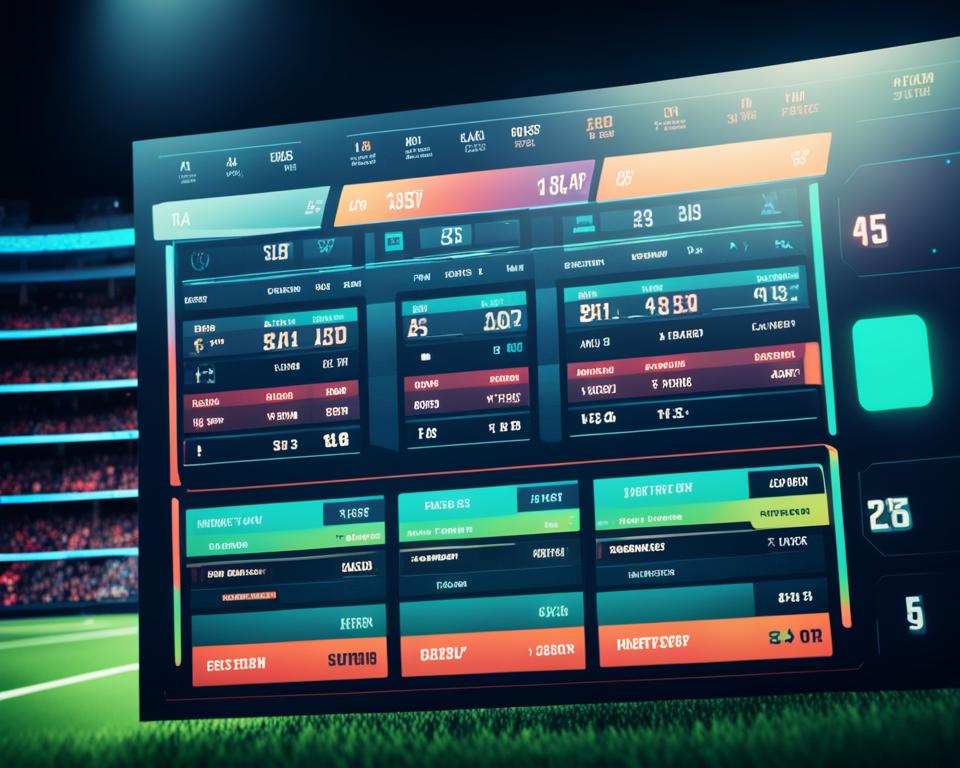If you’re new to sports betting, understanding sportsbook odds can be a bit overwhelming. The different symbols, numbers, and terminology can make it seem like a complex puzzle.
But fear not! This beginner’s guide is here to help you make sense of sportsbook odds. We’ll take you through the basics, explaining how to read odds and answering common questions along the way.
By the end of this guide, you’ll have a solid understanding of sports betting odds and be well-equipped to make informed decisions on your betting journey.
Key Takeaways:
- Understanding sportsbook odds is essential for successful betting.
- Sportsbook odds represent the likelihood of winning and the potential payout.
- There are different types of bets, including moneyline, spread, and total bets.
- Online sportsbooks offer a convenient and accessible platform for betting.
- Calculating betting odds involves considering the amount of money placed on each side of the bet.
Understanding Betting Odds
Understanding sportsbook odds is essential for successful betting. Whether you’re a newbie or looking to expand your betting knowledge, decoding sportsbook odds is a crucial step to increasing your chances of winning.
American odds are commonly used in sports betting, with symbols like + and – indicating the likelihood of winning and the amount you can win. The plus (+) sign represents the underdog or less likely outcome, while the minus (-) sign signifies the favorite or more likely outcome.
For example:
Team A: +150
Team B: -200
When reading these odds, the plus (+) value indicates the potential profit you can make for every $100 you wager on Team A, while the minus (-) value represents the amount you need to bet in order to win $100 on Team B.
It’s important to note that these American odds are based on a standard amount of $100. So, if you want to bet more or less than $100, you can simply adjust the calculations accordingly.
In addition to understanding the symbols used in odds, it’s also crucial to familiarize yourself with the different types of bets available. The three main types of bets are:
- Moneyline: This is a straightforward bet on which team will win the game. The odds will have a plus (+) or minus (-) sign before them.
- Spread: With spread betting, the sportsbook assigns a point spread to even the playing field between the favorite and the underdog. You bet on whether the favorite will win by more points than the spread or if the underdog will lose by fewer points than the spread.
- Total: Also known as over/under bets, this type of bet allows you to wager on the total number of points scored by both teams. You predict whether the total score will be over or under a certain number set by the sportsbook.
Now that you have a better understanding of betting odds, it’s time to put your knowledge into action. Online sportsbooks are widely available in most U.S. states, providing a convenient and accessible platform for placing bets. Just make sure to check the legality of online sports betting in your state before getting started.
Next up, let’s dive deeper into moneyline bets and how to maximize your chances of winning!
Moneyline Bets
A moneyline bet is a straightforward and popular type of bet in sports wagering. With a moneyline bet, you are simply betting on which team will win the game or event. The odds for moneyline bets are represented by a plus (+) or minus (-) sign before the numbers, indicating the potential payout for a successful bet.
To understand how moneyline bets work, consider the following examples:
American Football:
- Team A: +150
- Team B: -110
In this scenario, a moneyline bet of +150 on Team A means that if you bet $100 and Team A wins, you will receive a payout of $150 on top of your original $100 bet. On the other hand, a moneyline bet of -110 on Team B implies that you need to bet $110 to win $100 if Team B wins.
Soccer:
- Team X: -200
- Team Y: +300
In this example, a moneyline bet of -200 on Team X requires a $200 bet to win $100 if Team X is victorious. Conversely, a moneyline bet of +300 on Team Y means that a $100 bet on Team Y will result in a $300 payout if Team Y wins.
Moneyline bets provide a straightforward way to bet on the outcome of a game, with the potential payout clearly indicated by the odds. It is important to note that underdogs are typically represented by positive odds (+), while favorites have negative odds (-).
Understanding the concept of moneyline bets is essential for beginners in sports wagering. It allows bettors to place bets based on their prediction of which team will emerge as the winner.
Spread Betting
Spread betting is a popular type of wagering that adds an extra layer of excitement to sports betting. With spread betting, you not only have to predict the outcome of a game but also the margin by which a team will win or lose.
In spread betting, oddsmakers set a spread or a line that represents the number of points one team is expected to win or lose by. The underdog team will have a plus sign (+) in front of the spread, while the favored team will have a minus sign (-).
For example, let’s say the spread for a game between the Cleveland Browns and the Pittsburgh Steelers is Browns +3 and Steelers -5. If you bet on the Browns, they would need to win the game or lose by fewer than 3 points for your bet to be successful. On the other hand, if you bet on the Steelers, they would need to win by 5 or more points for your bet to win.
This type of betting evens the playing field and adds excitement, as a game that may otherwise seem one-sided becomes more challenging to predict. It also offers the opportunity for both favorites and underdogs to be profitable.
Benefits of Spread Betting
- Increased excitement: Spread betting adds an extra level of anticipation and intensity to your sports betting experience.
- More options: Spread betting allows you to explore different betting strategies and take advantage of potential opportunities.
- Potential for higher payouts: Since spread betting involves predicting the margin of victory, it can lead to higher payouts compared to traditional moneyline bets.
Example: NFL Spread Betting
Let’s take a look at an example to better understand spread betting in action:
| Team | Spread | Result | Outcome |
|---|---|---|---|
| Cleveland Browns | +3 | 17 | Win |
| Pittsburgh Steelers | -5 | 21 | Loss |
In this example, if you placed a spread bet on the Browns (+3) and they won the game with a final score of 17-21, your bet would be successful. On the other hand, if you had placed a spread bet on the Steelers (-5), you would have lost the bet.
Remember to always analyze the teams and their recent performance before placing spread bets. Consider factors such as injuries, team dynamics, and home-field advantage to make informed decisions.
Total Bets
Total bets, also known as over/under bets, are a popular betting option in sportsbooks. This type of bet involves wagering on the total number of points scored by both teams in a game. It allows you to predict whether the total points scored will be over or under a specific number set by the sportsbook.
When placing a total bet, the sportsbook will provide a number, such as 8, representing the total points. You then have the option to bet on whether the total points scored will be higher or lower than that number.
How to Read Total Bets
To illustrate, let’s consider a hypothetical game between the Cleveland Browns and the Pittsburgh Steelers. The sportsbook sets the total points line at 8. You have two options:
- Browns Over 8: If you believe the total points scored by both teams will be higher than 8, you can bet on the “Over” option. This means you’ll win the bet if the total points scored in the game is 9 or more.
- Steelers Under 8: On the other hand, if you expect the total points scored to be lower than 8, you can choose the “Under” option. This means you’ll win the bet if the total points scored in the game is 7 or less.
It’s important to note that the outcome of a total bet is not dependent on which team wins or loses the game. It is solely based on the total number of points scored by both teams combined. Total bets provide a different perspective on a game’s outcome and can be an exciting alternative to other types of bets.
| Option | Result |
|---|---|
| Browns Over 8 | Win if total points scored is 9 or more |
| Steelers Under 8 | Win if total points scored is 7 or less |
By understanding how to read sportsbook odds for total bets, you can make informed decisions when placing your bets. Keep in mind that sportsbooks may adjust the total points line, so it’s essential to stay up to date with the latest odds and information.

How Betting Odds Work
Betting odds play a crucial role in the world of sports wagering. Understanding how they work is essential for making informed betting decisions. Here, we’ll dive into the intricacies of sports betting odds and explain how they are calculated to help you navigate the world of sports betting with confidence.
Types of Odds
There are different types of odds used by sportsbooks, including British, European, and American odds. While they may vary in their presentation, the underlying principle remains the same – to represent the favorable outcome in a game.
Let’s take a closer look at the three main types of odds:
- American Odds: Commonly used in the United States, American odds are represented by a positive (+) or negative (-) sign. The plus and minus signs indicate the likelihood of winning and the potential payout. Positive odds indicate an underdog, and the number represents the amount you can win for every $100 bet. Negative odds, on the other hand, represent favorites and indicate the amount you would need to bet to win $100.
- British Odds: Often used in the United Kingdom, British odds are presented in fractions. For example, if the odds are 3/1, it means you can win $3 for every $1 bet.
- European Odds: Also known as decimal odds, European odds are widely used in continental Europe. They represent the total payout, including your stake. For example, if the odds are 2.5, your total return would be 2.5 times your stake.
While American odds are the most prevalent in the United States, it’s important to be familiar with all three types to understand odds in various betting markets.
Calculating Odds
Sportsbooks calculate odds by considering the amount they need to pay out if the bet wins. Their goal is to set odds that attract balanced betting on both sides, ensuring they can cover their potential losses and make a profit.
To calculate betting odds, sportsbooks assess different factors, including team strengths, historical performance, injuries, and other relevant information. This analysis helps them determine the likelihood of each outcome and set appropriate odds that reflect the potential risk and reward for bettors.
Here’s an example of how betting odds are calculated:
Team A: +200 (Underdog)
Team B: -150 (Favorite)
In this scenario, Team A is the underdog, and a successful $100 bet on them would yield a $200 profit. However, Team B is the favorite, and a $150 bet on them would generate a $100 profit. The odds take into account the perceived likelihood of each team winning, allowing bettors to make informed decisions based on the potential returns.
It’s important to remember that odds are not static and can change in response to betting patterns and other factors that impact the game or event.
Understanding how betting odds work gives you a competitive edge and helps you make strategic bets. Whether you’re betting on your favorite team or looking for an exciting wagering opportunity, grasping the fundamentals of sports betting odds is key to maximizing your potential winnings.
Sportsbooks Online
Online sportsbooks offer a convenient and accessible way to engage in sports betting. With a wide range of sports and betting options available, these platforms cater to both beginners and experienced bettors. Whether you’re interested in football, basketball, baseball, or any other popular sport, you can find an online sportsbook that suits your preferences.
When exploring online sportsbooks, it’s crucial to ensure that online sports betting is legal in your state before placing bets. While many states have legalized online sports betting, regulations can vary, and it’s essential to comply with the law to avoid any legal consequences.
One of the advantages of online sportsbooks is the convenience they offer. You can access these platforms from the comfort of your own home or on the go through mobile apps. This flexibility allows you to place bets whenever and wherever it’s convenient for you.
Additionally, online sportsbooks provide a wealth of information, making it easier for beginners to understand sports betting odds. They often include detailed explanations of different types of bets, tips, and strategies to help you make informed decisions. Furthermore, many online sportsbooks offer customer support to assist you with any questions or concerns you may have.
Benefits of Online Sportsbooks:
- Convenient access from home or mobile devices
- Wide range of sports and betting options
- Detailed explanations and resources for beginners
- Customer support for assistance
Engaging in sports betting through online sportsbooks allows you to enjoy the thrill of the game while potentially earning profits. However, it’s important to approach sports betting responsibly and set limits for yourself to avoid excessive losses.
| Benefits | Online Sportsbooks |
|---|---|
| Convenience | Access from home or mobile devices |
| Options | Wide range of sports and betting options |
| Resources | Detailed explanations and resources for beginners |
| Support | Customer support for assistance |
Take advantage of the opportunities offered by online sportsbooks, explore the different betting options available, and enhance your understanding of sports odds as a beginner. Engage in responsible sports betting and enjoy the excitement that comes with predicting the outcome of your favorite sports events.

Calculating Betting Odds
Sportsbooks determine the odds by carefully calculating the potential payouts based on the amount of money that bettors have wagered. These odds are designed to ensure that the sportsbook doesn’t lose money and can pay out the winners.
“The odds of an event happening are calculated based on the likelihood of that event occurring and the amount of money wagered on each possible outcome.”
When a lot of money is bet on one outcome, the odds for that outcome will decrease, making it less favorable for bettors. On the other hand, when less money is bet on an outcome, the odds for that outcome will increase, making it more appealing for bettors.
Calculating odds involves complex mathematical models and algorithms that take into account numerous factors such as historical data, team performance, player statistics, and public betting trends. By analyzing all of these variables, sportsbooks aim to set odds that accurately reflect the chances of each outcome, ensuring a fair and balanced betting market.
While the precise calculations used by sportsbooks may be intricate, bettors can use the provided odds to assess their potential winnings and make informed decisions. Understanding how to read sportsbook odds is essential for beginners who want to navigate the world of sports betting with confidence.
Sample Odds Calculation Table:
| Outcome | Amount Wagered | Probability | Odds |
|---|---|---|---|
| Team A Wins | $1,000 | 0.6 | -150 |
| Team B Wins | $500 | 0.4 | +250 |
In the sample table above, a bettor wagered $1,000 on Team A winning, which was assigned a probability of 0.6. The negative odds (-150) indicate that the bettor would need to bet $150 to win $100. Meanwhile, a $500 wager on Team B winning, with a probability of 0.4, would yield positive odds (+250), meaning that a $100 bet would result in a $250 profit.
Understanding how sportsbooks calculate odds provides valuable insight into the betting market and allows you to make more informed decisions. Take the time to familiarize yourself with odds and their implications to enhance your sports betting experience.
Conclusion
Understanding sportsbook odds is essential for beginners in sports betting. By familiarizing themselves with different types of bets and comprehending how odds work, novice bettors can make more informed decisions when placing wagers.
Throughout this beginner’s guide to sportsbook odds, we have explored the fundamentals of betting odds and how they are calculated. We have discussed three main types of bets: Moneyline, spread, and total bets, outlining their respective characteristics and how to interpret the odds associated with them.
To enhance your betting experience, take advantage of online sportsbooks, which offer a wide range of sports and betting options. Online platforms provide convenience, accessibility, and often feature useful tools such as betting calculators, which can help you calculate your potential winnings accurately.
By understanding sportsbook odds, employing strategic analysis, and leveraging the resources available to you, you can maximize your chances of success in sports betting. Remember to always bet responsibly and within your means.
FAQ
What are the different types of bets in sports betting?
The three main types of bets in sports betting are Moneyline, spread, and total bets.
What is a Moneyline bet?
A Moneyline bet is a bet on one team to win, with odds represented by a plus or minus sign.
How do spread bets work?
Spread bets involve giving each team a certain number of points that they must meet for you to win.
What are total bets?
Total bets, also known as over/under bets, involve betting on the total number of points scored by both teams.
How do betting odds work?
Betting odds represent the likelihood of winning and the amount you can win. They are calculated based on the amount the sportsbook needs to pay out.
Are online sportsbooks available in the United States?
Yes, online sportsbooks are available in most U.S. states and offer a wide range of sports and betting options.
How are betting odds calculated by sportsbooks?
Sportsbooks calculate odds by considering the amount they need to pay out and aim to keep both sides of the bet even.
Why is it important to understand sportsbook odds?
Understanding sportsbook odds is essential for making informed betting decisions and increasing your chances of success.
How can I calculate potential winnings?
You can use betting calculators available on sportsbook websites to calculate potential winnings based on the odds of your bet.





